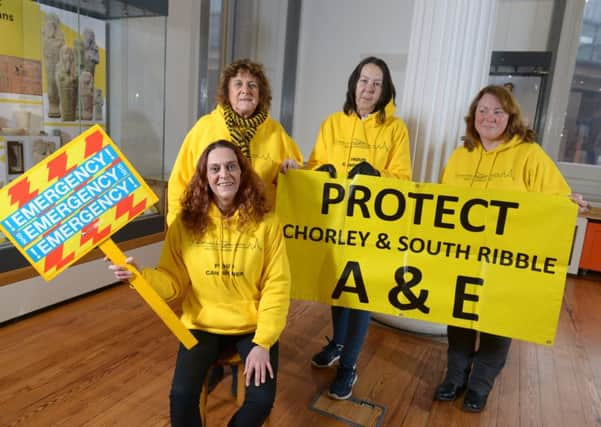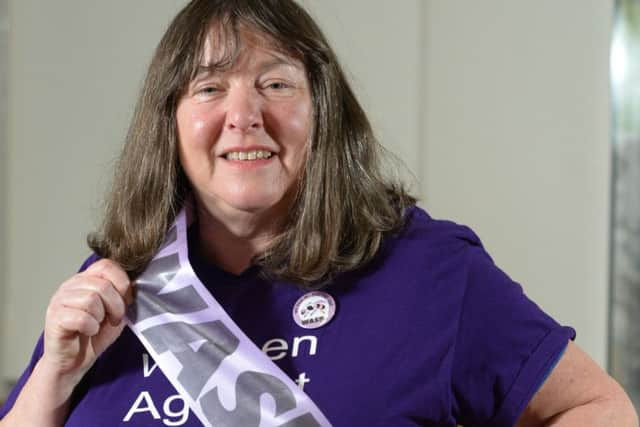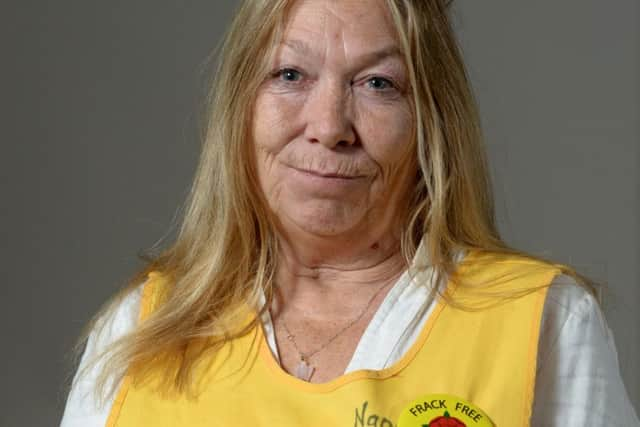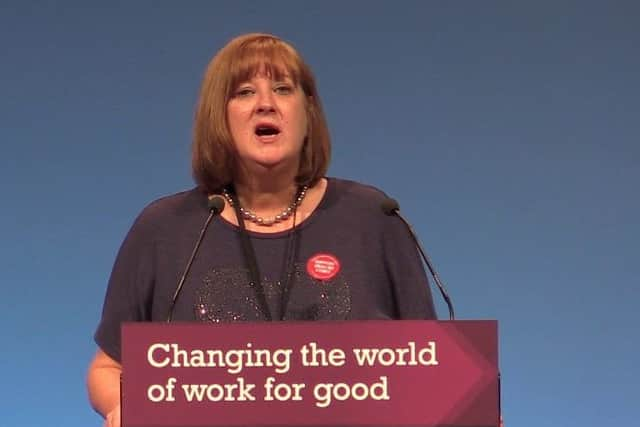Meet the militant women carrying on the suffragettes' struggle


The Suffragettes’ violent and militant tactics were not supported by all, in fact many felt they even set back the fight for the vote.
But they were undeterred, and put their bodies and even their lives on the line for their cause.
Advertisement
Hide AdAdvertisement
Hide AdAlthough women now have the vote on equal terms to men, there are many battles left to fight.


From childcare to pension rights to access to healthcare, women across Lancashire are still fighting for rights that they consider should be universal.
We meet a selection of the modern day campaigners who are heirs to the militant and determined tactics of those pioneering suffragettes.
Waspi women
One group of activists is fighting specifically for the rights of women born in the 1950s.


Advertisement
Hide AdAdvertisement
Hide AdThe WASPI women (Women Against State Pension Inequality) are campaigning against the state pension age for women which they argue is rising too quickly.
But their battle is not about fighting to keep the privileges enjoyed by women - to keep the pension age for women lower.
Waspi campaigners support the equalisation of the state pension age in line with men, but they argue that the way the changes have been implemented is unfair.
Chrissie Fuller, 61, of the Chorley Waspi group said: “Many WASPI women are facing challenges and uncertainty from suddenly finding themselves pensionless pensioners and faced with no jobs, no income and having to stand in line with everyone else at the JobCentre to claim handouts.


Advertisement
Hide AdAdvertisement
Hide Ad“I will have to wait six years for my state pension and was never officially informed of the fact other than the odd whisper in the media from which I caught on to the fact that I would probably have to wait until I was 66.”
Under the Pensions Act 2011, women’s state pension age will increase more quickly to 65 between April 2016 and November 2018. From December 2018 the state pension age for both men and women will start to increase to reach 66 by October 2020.
Waspi says that women born in the 1950s are facing financial hardship in retirement because of the lack of notice of the Government’s changes to their state pension age of up to six years.
They say that some women had as little as eighteen months notice and some women still do not know their state pension date has changed.


Advertisement
Hide AdAdvertisement
Hide AdMany of the 3.4 million women affected have no other source of income. Until the 1990s many women were not allowed to join company pension schemes and some left their jobs early to take on caring responsibilities in the expectation they would receive a state pension when they reached 60.
The Waspi women who gave up their jobs to care for elderly or sick relatives are now find themselves back in a job market where there are few opportunities for older women and forced into claiming benefits with the lack of security that entails.
Marie Cottam, 64, from Adlington, is a part time exam invigilator and single mum with a 16-year-old son and a 12-year-old daughter to support. She said: “I looked after my mother, who had Dementia, until she died.
“After she died I needed to go back to work but finding a job at the age of 62 was very difficult.
Advertisement
Hide AdAdvertisement
Hide Ad“I applied for various jobs but most of the time you don’t get an answer. You’re competing against younger people because the jobs that are available are lower income jobs or zero-hour contracts.
“I was lucky because I have been involved in girl guiding - being an exam invigilator in schools was like an extension so I thought I’d try it and I was very lucky.


“1950s women have never been equal, we weren’t allowed a pension until the 1990s - we were very much a second class.
“We have borne the brunt of austerity now has well as inequality all our working lives.
Advertisement
Hide AdAdvertisement
Hide Ad“I’ve had to wait four and a half years for my pension but my friend who lives next door has to wait until she’s 66.
“Since the changes to the pension age was announced many women had no time to put in place alternative financial arrangements.”
Waspi campaigners are calling for “fair transitional arrangements and suitable compensation” for all the 1950s men and women who have been caught up in the changes to the pension age.
To date they have brought about eight debates in Parliament which has helped MPs to appreciate the injustice those born in the 1950s are facing.
Advertisement
Hide AdAdvertisement
Hide AdJenny Hurley, 46, campaigning to reopen Chorley’s A&E 24/7
In April 2016, the A&E department at Chorley and South Ribble Hospital closed down. Following a vociferous and determined campaign from local people it has since reopened for daytimes only. The campaign continues to have the unit as a 24-hour facility again.
Jenny said: “I was just the same as most people that first week in 2016, we all went. Hundreds of people from Chorley turned up. The decisions was made to continue and we just carried on campaigning from there.
“It is the injustice of it - you just want to carry on.”
Jenny attends council meetings, Clinical Commissioning Group meetings and Lancashire Teaching Hospitals Trust meetings and meets MPs - just to follow what’s happening.
Advertisement
Hide AdAdvertisement
Hide AdShe said: “It’s pretty hard work, all of my life is taken up with it. I work full time and I take annual leave to go to meetings on weekdays. I’m out protesting every Saturday, sending emails in the evenings. My mum is also active within it.”
Jenny, who works in procurement, has been previously been involved in protesting against the apartheid in South Africa and against the poll tax
She said: “This one sparked that sense of injustice and ignited the light.
“It brings us together. It’s just such a close community. People are helping each other personally when some are ill. These are people who never knew each other before the campaign. Somebody had to move house and couldn’t afford a removals van so everybody brought their cars and helped him. It’s a family.“
Advertisement
Hide AdAdvertisement
Hide Ad“There’s more women than men generally – anywhere you go you’ll find it’s the women doing the work behind the scene.”
Tina Rothery, 55 - anti-fracking campaigner
One of the most controversial issues to hit Lancashire in recent years, proposals to drill for shale gas in the county have split the community.
Many people welcome the extra investment and jobs the industry could bring, but others think fracking is dangerous and damaging to the environment.
Among the most vociferous anti-frackers are women, including the ‘Lancashire Nannas.’
Advertisement
Hide AdAdvertisement
Hide AdTina Rothery, 55, from the group, said: “We are looking at about 70 per cent women among the protestors - mothers and grandmothers. Finding their self-empowerment to do this.
“I see women stubbornly determined, no matter what this horrible campaign does to our family lives. I started campaigning against fracking when there were just three groups in the country.”
At the forefront of many campaigns have been trade unions.
Jayne Taylor, Unite executive committee member, lays out her views on the battles fought and won, and those that still need fighting: “Change does not come from above. It never does. It has to be won by those who need and demand it. The right of women to vote was not gifted to them 100 years ago by Parliament, but won by the heroic and courageous suffragettes, and those who fought with them, who forced the government to act, though only in a limited way at that time.
And Lancashire and the north west is where so many women mill workers and others were active suffragettes in those long years leading up the Representation of the People Act in 1918.
Advertisement
Hide AdAdvertisement
Hide AdOur prime minister chose Manchester to make a speech on the anniversary of the Act, heaping praise on the many local women who were fearless in that campaign. Of course the birthplace of Emmeline Pankhurst and the women’s suffrage movement was the rightful venue for such a speech, but I was struck more by what Theresa May didn’t say than what she did.
For hers is a political party that has presided over policies that have hit women and families the hardest.
We have had eight years of austerityand some 86 per cent of the burden of that austerity has fallen on women.
Women are always disproportionally affected by public sector job losses, benefit cuts, declines in household incomes and the rise in informal social care?
Advertisement
Hide AdAdvertisement
Hide AdTheresa May claims the gender pay gap is at its smallest ever. The reality is it hasn’t changed in 100 years and the Fawcett Society has warned it could take another 100 years to close it. Women still earn on average 20 per cent less an hour than men. Low pay is endemic in jobs done mainly by women, the kind of insecure jobs that dominate the so-called gig economy.
Too many women who are stuck in temporary, zero-hour or other unstable work are missing out on basic rights at work.
One hundred years ago was the beginning of equal rights for women. But today’s world of work, in our low wage UK, shows that while much has changed in terms of the ability of some women to reach the highest levels in their industries, this is a country that continues to work not for the many, but for the few.
We know that workplaces with strong trade unions based on the power of the collective are more equal workplaces. As women we cannot wait for structural change to happen for us. Our suffragette sisters did not wait. All women should join a trade union, get involved in their union and change the world every day, not just when there is a general election.
Advertisement
Hide AdAdvertisement
Hide AdAnd when Theresa May claims she will enhance workers’ rights, remember it was her government that introduced employment tribunal fees, making it harder for workers to defend themselves against discrimination, hitting women hardest.
Deeds not words, prime minister, deeds not words.